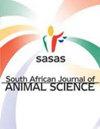Optimization of response to selection using genomic selection in indigenous chicken breeding programmes
IF 0.6
4区 农林科学
Q3 AGRICULTURE, DAIRY & ANIMAL SCIENCE
引用次数: 0
Abstract
This study tested the hypothesis that the use of pooled genetic and phenotypic parameters and genomic selection would optimize selection response in indigenous chicken breeding programmes. This premise was tested with deterministic simulation in three breeding schemes based on the sources of information used to estimate breeding values. These schemes used a conventional breeding scheme with non-pooled parameters (CSN), pooled parameters (CSP), and genomic information in a genomic selection scheme (GSS). A one-tier closed nucleus breeding programme was considered with a mating ratio of 1 to 5 for males to females, Four traits were used in the breeding goal, namely live weight at twelve weeks (LW), egg number for twelve weeks (EN), age at first egg (AFE), and antibody response (Ab). The genetic gain for CSN was 1.5 times higher than that of CSP. The rate of inbreeding for CSN was 19% lower than in CSP. The accuracy of selection followed the same trend with CSN producing 9% higher accuracy of selection than CSP. The GSS scheme resulted in an additional 59.3% genetic gain and 30% accuracy compared with CSP. The GSS scheme also had a reduced rate of inbreeding by 46% compared with CSP. When compared with CSN, GSS produced 38.7% greater genetic gain, a 27% lower rate of inbreeding and 21.0% higher accuracy of selection. Use of pooled parameter estimates and genomic information optimized response to selection, whereas non-pooled inputs overestimated and underestimated rates of genetic gain and inbreeding.利用基因组选择优化地方鸡育种计划对选择的响应
本研究验证了一种假设,即使用混合遗传和表型参数以及基因组选择可以优化本地鸡育种计划中的选择反应。基于估计育种值的信息源,对三种育种方案进行了确定性模拟。这些方案采用常规育种方案,在基因组选择方案(GSS)中加入非池参数(CSN)、池参数(CSP)和基因组信息。采用一层闭核育种方案,雌雄配种比例为1:5,以12周活重(LW)、12周卵数(EN)、首卵龄(AFE)和抗体应答(Ab) 4个性状作为育种目标。CSN的遗传增益是CSP的1.5倍。CSN的近交率比CSP低19%。结果表明,CSN的选择精度比CSP高9%。与CSP方案相比,GSS方案的遗传增益增加59.3%,准确率提高30%。与CSP相比,GSS方案的近交率也降低了46%。与CSN相比,GSS的遗传增益提高38.7%,近交率降低27%,选择精度提高21.0%。混合参数估计和基因组信息的使用优化了对选择的响应,而非混合输入高估和低估了遗传增益和近交率。
本文章由计算机程序翻译,如有差异,请以英文原文为准。
求助全文
约1分钟内获得全文
求助全文
来源期刊

South African Journal of Animal Science
农林科学-奶制品与动物科学
CiteScore
1.50
自引率
0.00%
发文量
39
审稿时长
>36 weeks
期刊介绍:
The South African Journal of Animal Science is an open access, peer-reviewed journal for
publication of original scientific articles and reviews in the field of animal science. The journal
publishes reports of research dealing with production of farmed animal species (cattle, sheep,
goats, pigs, horses, poultry and ostriches), as well as pertinent aspects of research on aquatic
and wildlife species. Disciplines covered nutrition, genetics, physiology, and production
systems. Systematic research on animal products, behaviour, and welfare are also invited.
Rigorous testing of well-specified hypotheses is expected.
 求助内容:
求助内容: 应助结果提醒方式:
应助结果提醒方式:


